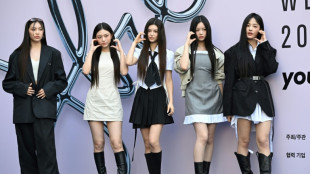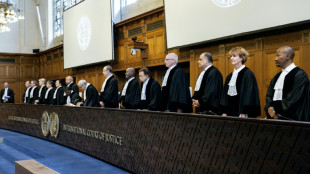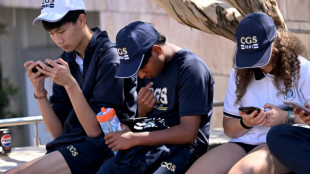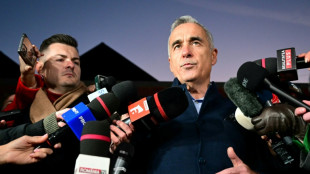
-
 Five things to know about NewJeans' shock split from agency
Five things to know about NewJeans' shock split from agency
-
Waste pickers battle for recognition at plastic treaty talks

-
 Ireland votes in closely fought general election
Ireland votes in closely fought general election
-
Top UN court to open unprecedented climate hearings

-
 European countries that allow assisted dying
European countries that allow assisted dying
-
British MPs to debate contentious assisted dying law

-
 Schmidt not expecting hero's welcome on Ireland return
Schmidt not expecting hero's welcome on Ireland return
-
PSG stuck between domestic dominance and Champions League woes

-
 'Hot fight' as unbeaten Bayern visit Dortmund fortress
'Hot fight' as unbeaten Bayern visit Dortmund fortress
-
Bordeaux-Begles' Samu 'not finished yet' with Wallabies

-
 Brook and Pope half-centuries haul England to 174-4 against NZ
Brook and Pope half-centuries haul England to 174-4 against NZ
-
Yen rallies on rate hike bets as equity markets swing

-
 Ukraine superstar Mahuchikh brings 'good vibes' to her war-torn country
Ukraine superstar Mahuchikh brings 'good vibes' to her war-torn country
-
PlayStation at 30: How Sony's grey box conquered gaming

-
 Saudi Arabia hosts UN talks on drought, desertification
Saudi Arabia hosts UN talks on drought, desertification
-
PlayStation: Fun facts to know as Sony's console turns 30

-
 Nepal's first transgender candidates run for local office
Nepal's first transgender candidates run for local office
-
Father of PlayStation says 'everyone told us we would fail'

-
 Ireland seek to overcome former coach Schmidt's Wallabies
Ireland seek to overcome former coach Schmidt's Wallabies
-
Detroit survive Bears comeback to make it 10 wins in a row

-
 Mexican actor Silvia Pinal dead at 93
Mexican actor Silvia Pinal dead at 93
-
'Black Friday' deals target inflation-weary US consumers

-
 Liverpool look to deepen Man City crisis, Amorim seeks first Premier League win
Liverpool look to deepen Man City crisis, Amorim seeks first Premier League win
-
Police fire rubber bullets, tear gas at Georgia protesters after PM delays EU bid

-
 England lose three quick wickets in reply to New Zealand's 348
England lose three quick wickets in reply to New Zealand's 348
-
Social media companies slam Australia's under-16 ban

-
 Police fire tear gas at Georgia protesters after PM delays EU bid
Police fire tear gas at Georgia protesters after PM delays EU bid
-
Canada watchdog sues Google over 'anti-competitive' ad tech

-
 Hojlund gives Amorim winning Old Trafford bow, Roma hold Spurs
Hojlund gives Amorim winning Old Trafford bow, Roma hold Spurs
-
Amorim wins first Man Utd home game after rollercoaster ride

-
 France arrests 26 as South Asian migrant trafficking ring smashed
France arrests 26 as South Asian migrant trafficking ring smashed
-
At least 15 dead, 113 missing, in Uganda landslides

-
 Netanyahu threatens 'intensive war' if Hezbollah breaches fragile truce
Netanyahu threatens 'intensive war' if Hezbollah breaches fragile truce
-
Bilbao join Lazio at Europa League summit, Chelsea cruise in Conference League

-
 In Lebanon's Tyre returning residents find no water, little power
In Lebanon's Tyre returning residents find no water, little power
-
Protests in Georgia after PM delays EU bid to 2028

-
 Biden slams Trump tariff threats as 'counterproductive'
Biden slams Trump tariff threats as 'counterproductive'
-
TikTok tactics shake up politics in Romania

-
 'He should do comedy' says Norris of Verstappen comments
'He should do comedy' says Norris of Verstappen comments
-
Americans celebrate Thanksgiving after bitter election

-
 Flood-hit Spain introduces 'climate leave' for workers
Flood-hit Spain introduces 'climate leave' for workers
-
UK's Starmer vows to slash net migration

-
 Recount order, TikTok claims throw Romania election into chaos
Recount order, TikTok claims throw Romania election into chaos
-
Jansen stars for South Africa as Sri Lanka crumble to 42 all out

-
 Bottas set for Mercedes return as Mick Schumacher quits reserve role
Bottas set for Mercedes return as Mick Schumacher quits reserve role
-
Putin threatens Kyiv with new hypersonic missile

-
 Georgia delays EU bid until 2028 amid post-election crisis
Georgia delays EU bid until 2028 amid post-election crisis
-
French PM announces concession in bid to end budget standoff

-
 Guardiola's ingenuity will solve Man City crisis, says Slot
Guardiola's ingenuity will solve Man City crisis, says Slot
-
South Africa in control after Sri Lanka crash to 42 all out


Father of PlayStation says 'everyone told us we would fail'
The PlayStation has been a colossal consumer hit, but three decades ago, its creator Ken Kutaragi struggled to convince both game-makers and his bosses at Sony that his console would be a winner.
"Everyone told us we would fail," Kutaragi told AFP in a rare interview.
With revolutionary 3D graphics and grown-up titles like "Tomb Raider" and "Metal Gear Solid", the device first hit shelves on December 3, 1994.
Before that, Nintendo's NES console and similar gaming machines were considered "children's toys", the 74-year-old Kutaragi said.
Popular games like "Super Mario Bros" were two-dimensional, and computer-generated imagery (CGI) was a rarity even in Hollywood.
"Most of the executives (at Sony) were fiercely opposed," fearing for the Japanese giant's reputation as a producer of high-end electronics, Kutaragi said.
Japanese game-makers gave a "frosty response" too, as creating 3D games in real time seemed "unthinkable" at the time.
Films with CGI took one or two years to make in those days, with budgets of tens of millions of dollars, he said.
But Kutaragi, then a Sony employee, was not deterred.
"We wanted to make the most of technological progress to create a new form of entertainment," the engineer said, his eyes gleaming.
His ambition paid off: the console -- now in its fifth generation -- became a household name. The PlayStation 2 was the world's top-selling games console with 160 million units sold.
- Nintendo drama -
Sony and fellow Japanese game giant Nintendo are industry rivals, but more than three decades ago they worked together to make a CD-ROM reader compatible with the Super Nintendo console, which could only take game cartridges.
With Nintendo's permission, Sony was also developing a machine capable of reading both CDs and cartridges, with the working title "Play Station" -- the first time the famous name was used.
But the pair's bonhomie ended dramatically.
Hours after Sony unveiled its new project at a 1991 Las Vegas trade show, Nintendo, spooked by Sony's rights over the games, announced it would team up with Dutch firm Philips instead.
The episode was seen as a betrayal and humiliation for Sony, and all of these burgeoning projects failed to materialise.
"Newspapers said it was bad for us," Kutaragi said. But "it was inevitable that we and Nintendo would follow our own paths, because our approaches were totally different".
For Nintendo, "video games were toys that had nothing to do with technology," he said.
And without the snub, the PlayStation as we know it "would never have seen the light of day".
- AI predictions -
When Sony launched its PlayStation and CD games in Japan in 1994, and in Western countries some months later, Nintendo had a stranglehold on console sales.
So Sony used its experience in the music industry to develop a new distribution model, selling the gadgets at electronics stores instead of toy stores and creating new supply chains adapted to local markets.
Kutaragi eventually became vice president of Sony but left the conglomerate in 2007 after the launch of the PlayStation 3, which initially struggled commercially.
Now the future of the console market is less rosy as "cloud gaming" grows in popularity, something that Kutaragi also predicted -- along with mobile gaming years in advance.
"I'd often reflect on the future of technology, over 10 or 20 years, to predict new trends," although "many people found that hard to understand", he said.
The engineer now runs a start-up focused on robotics and artificial intelligence and teaches at a Japanese university.
"We are entering a world where everything can be calculated" by a computer with the help of AI, Kutaragi said.
For example, generative AI chatbot ChatGPT "exists because language has become computable", and similar technology is being used in sectors as diverse as medicine, music and visual art.
"Imagine if time and space were also computable," he said.
"For the moment, this is a possibility limited to the world of video games," but "imagine that we could move instantly to any place", Kutaragi said.
"What was once science fiction could become reality."
Y.Bouchard--BTB
